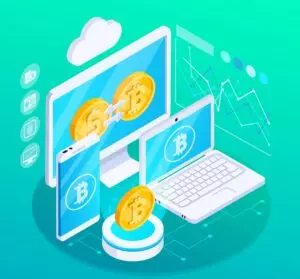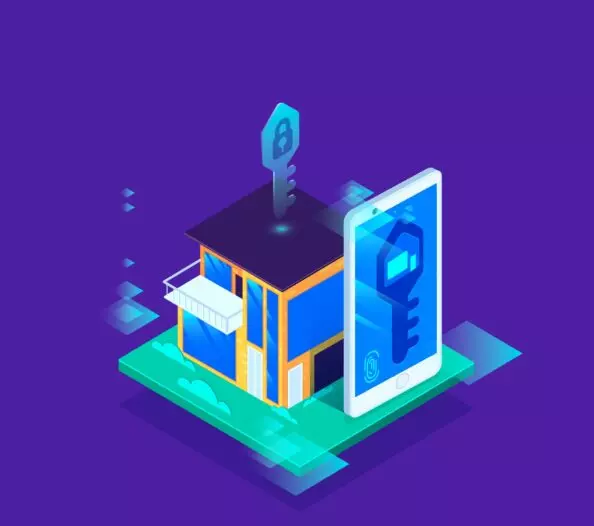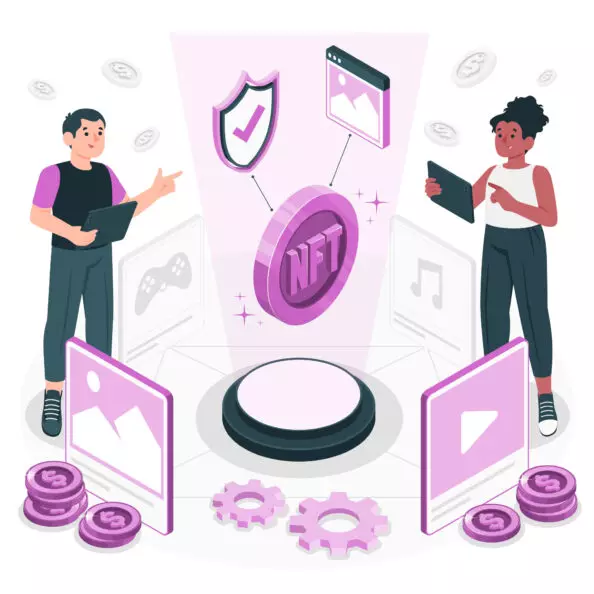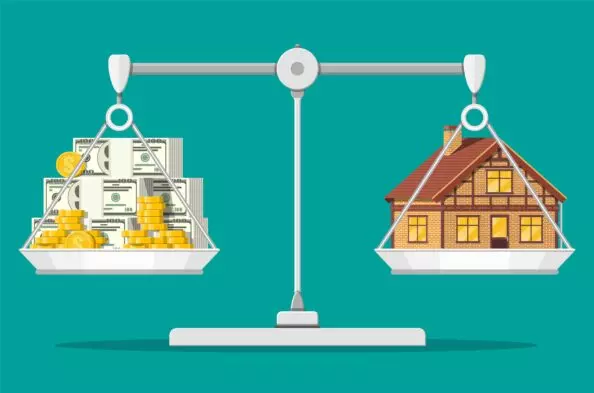
In recent years, the real estate industry has experienced a groundbreaking innovation that is revolutionizing property ownership and investment. Real estate tokenization, powered by blockchain and cryptocurrencies, is reshaping the market by unlocking new opportunities and efficiencies.
Tokenization involves transforming real estate assets into digital tokens, representing fractional ownership shares in a property. These tokens can be bought, sold, and traded on secure and transparent blockchain platforms. This technology breaks down large assets into smaller, more affordable units, democratizing access to lucrative investment opportunities that were once reserved for institutional players and the wealthy.
What is Real Estate Tokenization?

Real estate tokenization is the process of converting physical properties into digital tokens using blockchain technology. These tokens represent fractional ownership shares in the property. By tokenizing real estate, several benefits are realized:
- Enhanced liquidity: Tokenization enables faster and more efficient transactions by eliminating intermediaries and reducing paperwork.
- Transparency: Blockchain ensures that all ownership details and transactions are recorded and easily accessible, preventing fraudulent activities and fostering trust.
- Expanded investment opportunities: Fractional ownership allows smaller investors to participate in previously inaccessible markets, diversifying their portfolios across different properties.
- Regulatory landscape: Understanding the regulatory landscape is vital to ensure compliance and secure transactions.
Real estate tokenization offers increased liquidity, transparency, and access to investment opportunities. As technology advances and regulations evolve, it will transform the way we engage with properties, making it a significant development in the world of real estate investment.
The Benefits of Tokenizing Your Property

Tokenizing your property can bring numerous advantages and open up new opportunities in the real estate market. Here are compelling reasons why you should consider tokenizing your property:
Increased Liquidity
Tokenization allows fractional ownership, breaking down your property into smaller units that can be easily bought, sold, and traded on blockchain platforms. This enhanced liquidity opens the door to a wider pool of potential investors and reduces the time and costs associated with traditional real estate transactions.
Access to a Diverse Investor Base
By tokenizing your property, you can attract a broader range of investors, including retail investors who may not have had the means to participate in real estate investments before. This diversification of investors can enhance the stability and resilience of your investment.
Enhanced Market Efficiency
Tokenization eliminates intermediaries and reduces paperwork, making the buying and selling process more efficient. This streamlined approach leads to quicker transactions and lower transaction costs, benefitting both buyers and sellers.
Global Reach
With tokenization, your property can reach investors from around the world. Blockchain platforms enable seamless cross-border transactions, opening up international markets and increasing the exposure of your property to a global audience.
Transparency and Security
Blockchain technology ensures transparency and security by recording all transactions and ownership details on an immutable ledger. This level of transparency helps build trust among investors and reduces the risk of fraud.
Diversification of Investment Portfolio
Tokenizing your property allows you to diversify your investment portfolio by fractionalizing your asset and investing in multiple properties. This diversification strategy can help spread risk and potentially increase returns.
Regulatory Compliance
It is important to navigate the regulatory landscape when tokenizing your property. However, by working within the legal frameworks and complying with regulations, you can ensure a secure and compliant investment environment.
Tokenizing your property offers increased liquidity, access to a diverse investor base, market efficiency, global reach, transparency, and security. It is an innovative approach that can enhance the value and potential returns of your real estate investment.
How Does Real Estate Tokenization Work?
Real estate tokenization leverages blockchain technology to transform tangible real estate assets into digital tokens. Let's explore the key components of how real estate tokenization works:
Smart Contracts
At the heart of real estate tokenization are smart contracts. These self-executing contracts with terms written in code automate and enforce the rules and conditions of token transactions, ensuring transparency, accuracy, and trust. Smart contracts facilitate the issuance, distribution, and transfer of digital tokens, defining rights, responsibilities, and benefits associated with token ownership.
Special-Purpose Vehicles (SPVs)
Special-purpose vehicles (SPVs) are legal entities that hold the underlying real estate asset. By tokenizing the property, fractional ownership in the SPV can be represented by digital tokens. SPVs provide a separate legal structure that protects investors' interests and ensures compliance with regulations.
Security Token Offerings (STOs)
Security token offerings (STOs) are regulated fundraising methods for real estate tokenization projects. STOs involve the issuance and sale of security tokens representing ownership or investment rights in a real estate asset. Compliance with securities regulations protects investors and offers legal protection.
Decentralized Autonomous Organizations (DAOs)
Decentralized autonomous organizations (DAOs) enable the management and governance of real estate assets in tokenization. Token holders participate in voting on key decisions, such as property management, maintenance, rental agreements, or property sales. DAOs provide transparency, efficiency, and decentralization in real estate asset management.
Real estate tokenization brings together smart contracts, special-purpose vehicles, security token offerings, and decentralized autonomous organizations to create a secure and transparent system for fractional ownership and investment in real estate assets.
Legal and Regulatory Considerations for Tokenized Real Estate Investments

Tokenized real estate investments require careful consideration of legal and regulatory aspects. Here are key considerations:
Securities Regulations
Tokenized real estate investments may be classified as securities and subject to regulations such as registration and disclosure requirements. Compliance with securities laws ensures investor protection and transparency.
Know Your Customer (KYC) and Anti-Money Laundering (AML) Regulations
Adhering to KYC and AML regulations helps prevent illicit activities and safeguard investments. Tokenized real estate projects often require investor onboarding, and compliance with KYC and AML regulations is essential.
Property Ownership and Legal Frameworks
Transferring ownership rights to digital tokens involves understanding property laws and local regulations to ensure the validity and enforceability of tokenized ownership.
Jurisdictional Considerations
Regulations may vary across different jurisdictions, requiring a comprehensive understanding of the legal landscape in each location.
Audits and Investor Protection
Thorough audits provide confidence in smart contract terms, token mechanics, and investment structures. Clear and comprehensive disclosure documents, along with accurate information regarding risks and potential returns, foster trust and compliance with investor protection regulations.
Adhering to legal and regulatory considerations protects investors, maintains market integrity, and supports the successful integration of tokenization within the real estate industry.
Taxation on Tokenized Real Estate

Tokenized real estate investments have tax implications that investors and stakeholders must consider. Here are key tax considerations:
Capital Gains Tax
When selling or disposing of a tokenized real estate asset, any resulting capital gains may be subject to taxation. Consultation with tax advisors is important to determine applicable tax rates, exemptions, and deductions.
Rental Income Tax
Tokenized real estate investments that generate rental income are subject to rental income tax. Consider deductions, allowances, and tax incentives specific to rental income from tokenized real estate.
Value Added Tax (VAT) and Goods and Services Tax (GST)
The sale or transfer of tokenized real estate may attract VAT or GST in some jurisdictions. Tax treatment varies depending on the jurisdiction's tax laws and regulations.
Withholding Taxes
Cross-border transactions involving tokenized real estate may trigger withholding tax obligations. Rates and requirements depend on the jurisdiction and investor's tax residency.
Transfer Taxes
Tokenized real estate transactions may be subject to transfer taxes or stamp duties. Rates and requirements vary by jurisdiction and should be considered during the tokenization process.
Token Utility and Utility Token Taxation
Tokens associated with real estate investments may have utility functions within a specific ecosystem. The tax treatment of utility tokens varies depending on the jurisdiction and their classification for tax purposes.
International Tax Considerations
Tokenized real estate investments involving multiple jurisdictions may have complex international tax considerations. Consider double taxation treaties, foreign tax credits, and tax residency rules.
Tax regulations and laws regarding tokenized real estate are still evolving. Consulting with tax professionals and legal advisors specializing in cryptocurrency and blockchain taxation is essential for compliance and navigating complexities.
What Types of Real Estate Assets Can Be Tokenized?

A wide range of real estate assets can be tokenized, providing new opportunities for investors and market participants. Virtually any type of real estate asset can be tokenized, including residential properties, commercial buildings, retail spaces, industrial facilities, hotels, and undeveloped land.
Residential properties, commercial real estate, specialized assets like hotels and resorts, and even undeveloped land can all be tokenized. Tokenization enables fractional ownership, increased liquidity, and broader access to a variety of real estate asset classes.
Types of Real Estate Tokenization

Real estate tokenization can take different forms, each catering to specific investment opportunities:
- Commercial Tokenization focuses on digitizing ownership of commercial real estate assets, increasing liquidity, and accessibility for investors.
- Residential Tokenization allows fractional ownership of residential properties, providing opportunities for institutions, developers, and investors.
- Trophy Tokenization involves tokenizing prestigious and high-value real estate assets, making them accessible to a wider range of investors.
Each type of real estate tokenization opens up investment possibilities in different sectors of the real estate market. With fractional ownership, increased liquidity, and broadened investor access, tokenization democratizes real estate investment and expands opportunities in the market.
Who Is Involved in the Tokenization Process?

Multiple key players contribute to the successful implementation and execution of tokenized real estate investments:
- Real estate operators are entities or individuals who own, manage, or develop the underlying real estate assets, providing necessary information for tokenization.
- Tokenization platforms are specialized platforms or service providers that facilitate the digitization and issuance of tokens, ensuring compliance and technical infrastructure.
- Investors participate in tokenized real estate investments, acquiring tokens representing fractional ownership or investment in the assets.
Collaboration between these key players enables seamless tokenization of real estate assets.
Multiple Benefits of Real Estate Tokenization
More Transparent and Efficient Transactions

Tokenization introduces transparency to the real estate market by leveraging blockchain technology. Smart contracts ensure that all transaction details, ownership rights, and property management agreements are recorded immutably on the blockchain. This transparency reduces fraud, disputes, and the need for intermediaries, resulting in faster and more efficient transactions.
Better Liquidity
Tokenization unlocks liquidity in the real estate market by enabling fractional ownership. Investors can trade tokens on secondary markets, providing greater flexibility and ease of exit compared to traditional real estate investments. Secondary markets enhance liquidity and allow investors to buy and sell tokens more freely.
Opportunity for Small-Scale Investors
Real estate tokenization breaks down barriers to entry, allowing small-scale investors to participate in lucrative real estate investments. Fractional ownership through tokens enables access to high-value properties that were previously out of reach due to high capital requirements. This democratization provides opportunities for a broader range of investors to diversify their portfolios and benefit from real estate's potential returns.
A Free-Flowing Market
Tokenization removes geographic barriers, allowing investors to access real estate assets globally. Investors can choose from a wider range of properties, diversify their portfolios across different regions, and capitalize on emerging real estate markets.
Decrease in Counterparty Risk
Real estate tokenization reduces counterparty risk through smart contracts. Smart contracts automate transaction processes, removing the need for intermediaries and reducing the risk of fraudulent activities. Tokenization provides a clear chain of ownership and protects investors' rights and obligations, enhancing trust and reducing counterparty risk.
Real estate tokenization brings benefits such as transparency, liquidity, accessibility, decreased counterparty risk, and increased investment opportunities. It transforms the way real estate is bought, sold, and invested in, making it more inclusive, efficient, and accessible for a wide range of investors.
Limitations of Real Estate Tokenized Assets

While real estate tokenization offers numerous benefits, it is essential to consider the limitations and challenges associated with tokenized assets:
Smart Contract Security Loopholes
Smart contracts can be susceptible to security vulnerabilities. Flaws or bugs in the smart contract code can lead to potential exploits or breaches, putting investors' funds and property rights at risk. Thorough security audits and testing of smart contracts are crucial to mitigate these risks.
Complex Licensing Requirements
Tokenization may be subject to complex licensing requirements depending on the jurisdiction. Understanding and complying with licensing obligations is important to avoid legal complications and penalties.
Regulatory Issues
The regulatory landscape surrounding real estate tokenization is still evolving and can vary across jurisdictions. Compliance with securities, crowdfunding, anti-money laundering, and investor protection regulations is crucial.
Tax Complexities
Tokenized real estate transactions may introduce new tax complexities. Tax treatment may vary depending on jurisdiction, investment nature, and holding period. Professional tax advice is necessary to understand tax implications and ensure compliance with tax laws.
Centralized Reporting Requirements
The decentralized nature of blockchain-based tokenization can create challenges in terms of centralized reporting. Regulatory authorities may require centralized reporting of transactions for effective monitoring and regulation. Balancing decentralization with reporting requirements is a significant challenge.
Reconciliation with Legal Frameworks
Reconciling tokenized assets with existing land registries and legal frameworks can be complex. Integration with traditional systems and ensuring legal validity and enforceability of tokenized ownership rights requires collaboration with relevant authorities.
Addressing these limitations and challenges through technological advancements, regulatory clarity, and industry collaboration is essential for successful implementation and adoption of real estate tokenization.
Real Estate Tokenization Platforms

Real estate tokenization platforms facilitate the process of tokenizing real estate assets. These online platforms leverage blockchain technology and smart contracts to create and manage security tokens representing fractional ownership or investment in real estate properties. Key features of these platforms include token issuance and management, regulatory compliance, investor onboarding, secondary market access, asset management and reporting, investor communication, and blockchain integration.
Real estate tokenization platforms revolutionize real estate investments by enhancing accessibility, liquidity, transparency, and efficiency. They provide infrastructure, compliance mechanisms, and user-friendly interfaces to tokenize and manage real estate assets, opening up new opportunities for investors and property owners in the market.
Real Estate Tokenization Examples

Real estate tokenization has gained significant traction in recent years, with notable examples showcasing its potential. Here are a few examples:
- St. Regis Aspen Resort: The luxury resort partnered with a tokenization platform to offer tokenized shares in the property, enabling investors to benefit from its revenue and potential appreciation.
- The Shard, London: The iconic skyscraper explored tokenization to increase liquidity and democratize access to ownership.
- Properti: A real estate developer in Indonesia utilized tokenization to enable fractional ownership of their properties, making investments more accessible.
- The Aspen Coin: The Aspen Coin represents ownership in the St. Regis Aspen Resort and was sold through a Security Token Offering, enhancing liquidity and trading flexibility.
- Harbor Platform: Harbor Platform facilitates compliant issuance, investor onboarding, secondary market access, and investor communication for real estate tokenization projects.
These examples demonstrate the potential of real estate tokenization in unlocking new opportunities and transforming the real estate industry.
Real Estate Tokenization vs. Fractional Ownership

Real estate tokenization and fractional ownership are two approaches to real estate investment. While they share similarities, they have distinct differences.
Real estate tokenization involves the representation of ownership rights through digital tokens on a blockchain. Fractional ownership refers to the division of a property's ownership into shares, typically structured as legal entities. Tokenization offers increased liquidity, accessibility, and potential trading flexibility, while fractional ownership provides a more traditional ownership structure with established legal frameworks and collective decision-making processes.
The choice between real estate tokenization and fractional ownership depends on investor preferences, risk appetite, and access to investment opportunities.
Security Token Offerings vs. Non-Fungible Tokens

Security token offerings (STOs) and non-fungible tokens (NFTs) are distinct concepts in blockchain-based digital assets. STOs involve the issuance of security tokens compliant with securities laws, offering ownership or investment rights. NFTs represent unique ownership or proof of authenticity for specific items. While both leverage blockchain for transparency and security, STOs focus on investment opportunities and compliance, while NFTs focus on unique ownership and authenticity.
Understanding the differences between STOs and NFTs is crucial in the world of blockchain-based digital assets.
Tokenization vs. Traditional Real Estate Investment: A Comparative Analysis

Tokenization and traditional real estate investment differ significantly. Traditional investment involves direct acquisition of physical properties, high capital requirements, property management responsibilities, and limited liquidity. Tokenization offers increased liquidity, accessibility, and fractional ownership opportunities, making real estate investment more inclusive and efficient.
Future Trends and Opportunities in Tokenization of Real Estate Assets

Real estate tokenization is set to experience significant growth in the coming years, with several key trends and opportunities:
- Increased adoption as regulations become more favorable.
- Diverse asset types, extending beyond residential and commercial properties.
- Global market participation, removing geographic barriers.
- Integration with decentralized finance and lending platforms.
- Focus on investor protections, industry standards, and best practices.
- Fractional ownership of high-value assets, democratizing real estate investment.
Real estate tokenization has the potential to reshape the real estate industry, creating a more inclusive investment environment. It offers increased liquidity, accessibility, and transparency, transforming how we approach real estate investments.
In conclusion, real estate tokenization is an innovative approach that unlocks new opportunities in the market. It offers increased liquidity, accessibility, and potential returns for investors while providing transparency and security. As the industry continues to evolve, tokenization will reshape the future of real estate investments, making them more inclusive, efficient, and accessible for a wide range of investors. To learn more about real estate tokenization, consult our experts.

















